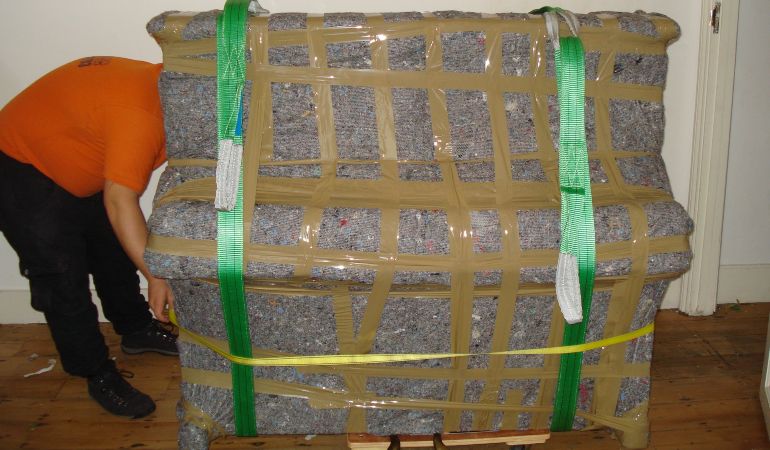
Pianos are a great musical instrument, inspiring centuries of classical musicians and giving way to a beautiful imagination. It’s not the same if you want to move one.
Before moving a piano yourself, take in mind that it is a dangerous task and think about calling for help. It’s highly recommended to call a professional mover if you think you won’t be able to move the piano by yourself, even though the removals service prices are not low for piano removals.
Table of Contents
What you need to move a piano?
If you have a grand piano, stop whatever you’re thinking of doing and call a removal company. Removals experts do not recommend amateurs do any experiments with those. This guide is all about moving an upright piano. So, for the removal of a piano needed:
- Tape;
- Work gloves;
- Plastic wrap (cloth can be used too);
- Heavy duty dolly;
- Dolly straps;
- Weightlifting straps;
- Van ramp;
- Cardboard pads;
- Upper body strength of at least 4 people.
How to move an upright piano by yourself
Measuring the upright piano dimensions
Before doing anything else, start by measuring the piano’s size. You have to be 100% sure of the exact dimensions of your particular upright piano. This will help you to carefully plan the whole process of moving it.
Normally, an upright piano has a height of 110 to 135cm, a width of about 150cm, and an approximate depth of 60cm. Mind that these dimensions vary, and yours are probably slightly different. Though, the average size is usually 125/150/60 cm.
Transporting your piano properly will help you to cut down on moving costs because you will not have to pay professionals to do it for you.
Proceed with the moving process
- Measure and clear the path. Use tape or a rope to measure the door frames and make sure the piano can fit through them. Then clear the path from any obstructions, including carpets.
- Remove decorations, if any. A good thing about upright pianos is that they have a shape that’s not a pain to handle, unlike grand pianos.
- Wrap the piano. Firstly, wrap the lid over the keyboard with tape, just in case. This is done to ensure that the lid stays in place during the ride. For the rest of the instrument, you can either use a plastic wrap or cloth that’s big enough to cover it completely. Secure the wrap with tape.
- Lift piano on a dolly. For this, you will need to put on your work gloves and get help from friends. If you never thought about how heavy is a piano – the weight of an upright piano is around 130 kg. As a comparison, a grand piano can reach 500 kg. You need at least three strong pairs of arms for lifting an upright piano on the dolly (and at least six for a grand piano). While professionals use electronic devices to make it easy, safe and with minimal strain.
- Strap piano securely with dolly straps.
- Push with the dolly.
- Use a ramp for the van. The piano should be both pulled and pushed in the van at the same time. Use the lifting straps for that and be very careful when standing behind it, the piano weight is big enough to crush you or at least cause a minor injury if you’re not careful enough.
- Secure the piano in the van. The piano should be placed against the back wall of the van with plenty of other stuff in front of it. You can secure it with furniture.
Check also:
How to move a grand piano
There are plenty of ways to move a grand piano. This is just one of the ways to do it safely and with great efficiency. It’s also done step by step in the embedded video below:
- Wedge the keyboard cover shut by stuffing tissue paper at each end.
- Remove the keyboard cover if it’s possible and wrap in soft fabric for extra protection.
- Remove the lid hinge pins with extra care and then unwind the screws on the plate that holds the pins.
- After nothing holds the lid anymore, lift it from the piano, without sliding or rubbing it against the instrument. Set it aside and wrap it carefully to protect from scratches during transportation.
- Find out which piano leg is labelled as number 1 and remove it. Place gently the piano so its board cover rests on a thick and soft tissue, previously laid on the floor at the side of leg 1.
- Hold it in this position while someone else removes the rest of the legs from the grand piano.
- Pad out all three legs separately.
- Cover the whole piano with moving blankets.
- Proceed with loading the piano in the van. If the instrument is on an upper floor of the property and there is a lift, which is big enough, you can use it. Otherwise, at least 3 movers will be required to carry the piano down the stairs.
- Put moving blankets on the floor of the van’s boot before placing the piano on top.
Josh Brunelle

Relocation expert at Learn to Move
But always remember the most important of our DIY piano moving tips: even with full knowledge of how-to move pianos, actually moving your piano carries with it a lot of responsibility for piano moving safety for the movers and for the piano and its value. You may want to explore other options like what will be the price for professional movers to move the piano for you long distance, locally, to a storage facility, or even up stairs.
How to move a baby grand piano
Simply follow the same procedure as for the standard grand piano. The only difference is that the baby grand piano is smaller in size.
This means that you may not need a third person for the job. Still, if the property size makes the moving house process tedious, find one or two more people to get the job done. Better safe than sorry when it comes to moving such an expensive musical instrument.
Don't injure yourself! Get in touch with the specialists!
Enter your postcode to view our rates and availability in your area.
For questions about the services we offer visit our main site or you can always call us at 020 3746 0584
How to move a piano on a carpet
Having a carpet beneath the piano makes things a lot more complicated. It’s common to cause damage to the musical instrument if you try any wrong moving techniques. The legs of the piano are designed to carry its heavy weight and keep it steady. If a piano has no wheels, then it’s not meant to be moved without being dismantled first.
Pushing a piano over a carpeted floor will cause the legs to snap from the extreme weight of the instrument and the surface friction of the carpet. This is why we strongly advise you not to do this in an attempt to move the piano. Instead, we suggest you do the following:
- Find a piece of flat plywood, big enough to be placed under the piano so all 3 legs can step on it.
- Call someone for help, as many people as you need. This will depend on the size of the piano but you’ll probably need at least 3 people.
- Lift the legs one by one and carefully slide the plywood beneath each leg of the piano.
- Once all the legs are on the plywood, ask your helpers to apply some pulling force on the piano so they lift a portion of its weight.
- Push the piano in the direction you want to move it. You will feel it a lot lighter because of the manpower used to lift most of the weight.
- Take breaks if the distance is long, don’t try to move the piano in one go. After all, you don’t want for anyone helping you to get hurt by over-exerting them, right?
- Once the piano gets to its new location, remove the plywood from underneath each leg. Do this by applying a similar technique as the one you used to put the piano on top of the plywood.
Call professional movers if you can’t handle this tedious task alone, especially if you’re moving abroad. Getting help from a removals company for your piano removals often proves to be the most time- and cost-effective solution. It will also take much less time to move house with the help of a reliable moving company.
Check also:
How to move a piano on hardwood floors
To move a piano on a hardwood floor, you can use the same technique as the one for moving a piano on a carpet. Still, there are some additional tips we would like to share that will make the process faster and easier.
- Close and lock the lid of the piano. It must remain closed when you move and tilt the instrument.
- Check the piano legs for any damage or malfunction. If you notice cracks or any signs of wear, be extremely cautious while you’re moving the instrument. If the legs are badly damaged, call professional movers for help. You can also consider a restoration procedure but don’t risk moving it if it’s in a really bad condition.
- Dismantle any non-essential parts of the piano to reduce its weight during transportation.
- Also, minimise surface friction by mopping the hardwood floor, first, to make it more slippery. This will help you slide the plywood sheet by using less force.
How to move a piano up a ramp

Using a piano trolley to move the instrument is one of the best possible solutions to complete this tedious task. Movers often put the piano on a dolly before getting it onto the ramp. There are some quick steps you need to follow afterwards to make the process easier for you:
- Use metal stair ramps if you have to carry the piano downstairs.
- Prepare the van’s loading ramp before you do anything else.
- Take care of the rest of the ramps that will be required for the loading process of the piano.
- To move the dolly with the piano downwards the ramp, you’ll need two men at the front of the dolly and one at the back. This way, you’ll ensure that the instrument is moved safely and gets down intact.
- Make small steps when pushing and pulling the piano, while on the ramp, don’t apply too much force all at once. You don’t want it to slide down uncontrollably while it’s on the piano dolly.
- Ask someone to supervise the whole process by carefully looking for any bumps on the ground. Not spotting in time obstacles on an uneven surface may result in causing damage to the piano or even losing grip of the piano dolly.
- When you get to the van ramp, have at least two people at the back of the load. You’ll need one or two more at the front to lift the dolly’s front wheels and put them on the loading ramp of the van. Then, watch closely how the dolly moves upwards and stop pushing if it steers to the left or to the right. Fix the front end of the dolly to point forwards and continue pushing until it gets into the van.
How to move an upright piano downstairs
The serious trouble, however, comes when a step or a flight of steps lie on your path to the van. This is also the main reason why people call professionals.
If there is only one step, you can use the weightlifting straps, lift the piano along with the dolly and carry it down. For more steps, you’ll have to lose the dolly. Place cardboard pads on all steps so that you avoid scratching the surface. The piano should be held by everyone with lifting straps. Lift and put down one step at a time.
How to move an upright piano upstairs
Bringing a piano up a flight of stairs requires the same amount of lifting, but you’ll find out it will tire you out a lot more. Just as with the previous lifting method, remove the dolly and use straps and cardboard pads. Lift the piano one step at a time, just like when moving it downstairs.
Check out this video, which shows how to finish the whole process of moving a piano upstairs:
Important!
If the piano loses balance, get out of its way, otherwise, it may cause serious injury and even death.
Don’t forget to tune the piano anew when the move is over. It may look tough, but the inner mechanics are sensitive to just about anything.
Another clever thing to do when you’re done with the piano moving process is to hire a long-term storage facility where you can store the musical instrument for as long as you need. When you’re ready to install it at the new address, the moving company will deliver it to your exact address.
Book Fantastic Removals for a quick relocation!
Enter your postcode to view our rates and availability in your area.
For questions about the services we offer visit our main site or you can always call us at 020 3746 0584








